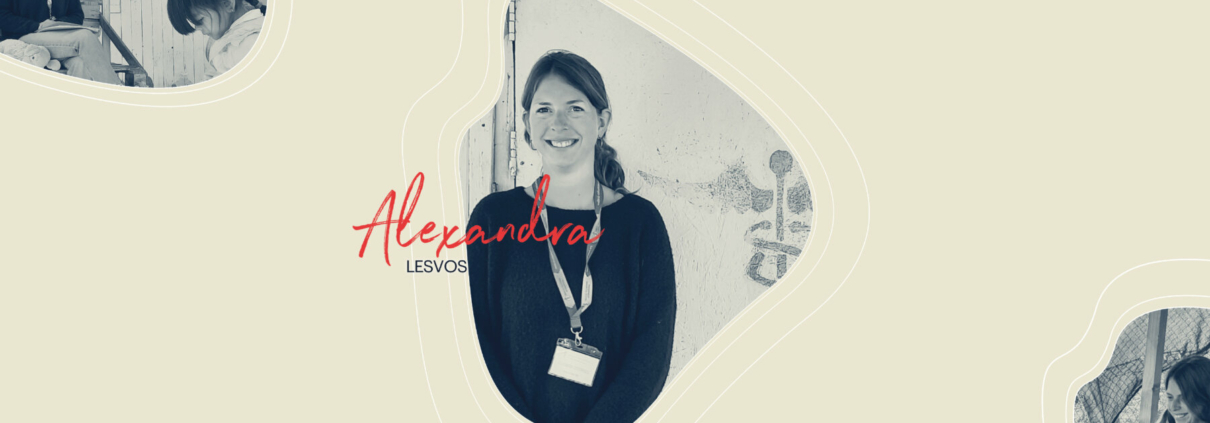“Most of the parents feel helpless” – “I usually explain to them that their children are normal, but the circumstances are not”
Alexandra Osterhues is a specialist doctor for children and adolescent psychiatry and psychotherapy in training, coming from Hannover. Her first mission with MVI took her to Lesvos where she supported a mental health project that aims to provide stability and psychological care to young children and their parents in this very difficult environment.
How did you learn about MVI?
I had been thinking about the situation of people on the move – in particular about families and children – for quite some time. And also about how I could help. Sure, you can donate, which is just as important and I did that, too. But at the same time, I knew that as a doctor, I would also like to support actively. That’s why I looked around a bit and then found out about MVI online.
How did you feel before coming to Lesbos?
I read about the situation on the ground, and I watched videos. But I had no specific idea of what it would be like to actually be there. I was very excited before I arrived and had a lot of questions on my mind: Will I meet the requirements of this project? Do I have enough experience? Will I be able to handle it? I have been abroad many times before but Lesvos was something different.
And what was it like after you arrived?
It was very paradoxical. On the one hand, you have these beautiful beaches, bars, sunshine – an absolute holiday oasis. On the other hand, you have the camp where thousands of people have to live with nothing. People who came to Lesvos by themselves have to live in a tent with more than 100 people. You have to imagine that these things happen inside the borders of the EU. The place is very authentic, you see the beautiful and the worst in a very small area. I was sad, disappointed and also angry that we just let this happen. Which is why I felt powerless and helpless in the beginning. I thought: Wow, here I am now and I can’t do anything.
Was there really nothing you could do?
No, in fact, the initial feeling subsided considerably after about a week. I had somehow accepted that these are the circumstances and I had to help in the ways that I could, even if it was in smaller ways.
What is the project, that you supported, about?
We provide psychological support to families, parents and children in groups, but also in individual sessions. The patients are often frustrated and helpless, have experienced traumatic things – and still do. As a result, many children are aggressive, have nightmares, have stopped speaking, they self-harm or wet the bed. These are all symptoms that occur because the children have to try to grow up under these undignified conditions. I have met very desperate parents who have to watch their children become sicker every day, while being unable to help.
What was your advice to the parents?
Of course, the parents feel powerless, they feel left alone. A lot of them want to talk to someone and they explain that no one has listened to them for a long time. This is very touching. I usually explained to them that their children are normal, but the circumstances are not – they are so terrible and very bad for children. These circumstances make it almost impossible for children to have a healthy psyche. What can help is to establish rituals, to create moments of self-determination, to have fixed meals together, to play with the children. This kind of experience is often missed out. But imagination, singing, playing, movement, talking about emotions – all this is essential for the development of children and creates small moments of normality.
What were the interpersonal encounters like that you experienced?
Very touching. Every family, every person on the move has their own story, their own fate. MVI works exclusively with translators from the community, i.e. people on the move themselves. You spend a lot of time with them in the projects. I met a woman who tried to get from Turkey to Europe four times. She told me what she experienced when crossing the sea. The engine of their boat was stolen. Two babies did not survive the crossing. She has now been living with her family in the camp on Lesvos for over three years. Her husband was serving in the army in Afghanistan. They were incredibly afraid of the Taliban. Nevertheless, her asylum application has already been rejected four times. But despite all these experiences, she told me: “I am happy every day to have made it this far and to know that my children will still be alive tomorrow.”





Your point of view caught my eye and was very interesting. Thanks. I have a question for you. https://www.binance.com/ka-GE/register?ref=RQUR4BEO